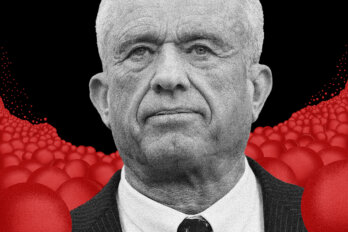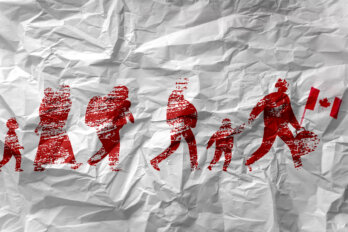Arielle and I have gone through the motions dozens of times. On Christmas Day, the gig is no different. My partner and I walk into my childhood home in the suburbs of north Toronto, waltz into the basement living room, and find my grandmother perched on a leather armchair in the corner. We greet her with a kiss on each cheek, and we humour her as she eyes us up and down and remarks on our thin frames. “Così bella,” she comments. Then, without fail, in her signature southern Italian accent: “You are the two sisters!” It’s intended to be a compliment, one that suggests we are of equal beauty. Instead, it belittles the very nature of our four-year relationship, reducing it to a bond of sorority instead of romantic devotion.
In the moment, neither Arielle nor I betray these feelings to Nonna. How could we? Just one look at her tiny shoulders and her round, chocolate-brown eyes, sends guilt simmering into my stomach. I choke back my biting words—we look nothing alike—and clench my jaw. Arielle giggles, fake and airy, and I sense her discomfort immediately; I watch her back straighten, teeth wired shut. We stand a metre apart, creating the unconscious distance the seventy-nine-year-old matriarch of my family has pushed on us. There’s nothing gay to see here.
For years, I have kept my sexuality a secret from Nonna, my father’s mother. Born and raised in the rolling hills of Calabria, Italy, she has lived a life of tradition, of fulfilling expectations. Queerness doesn’t exist in her world, and when it tries to break in, it doesn’t goes over well. I learned, as a young teenager, of a family friend whose daughter came out; she was in love, tired of hiding. Her mother disowned her, and Nonna applauded the decision—any other reaction would have been sinful. Grappling with my own sexuality, I made the choice at fourteen: while I’d eventually come out to my parents, brother, friends, and extended family, I would never come out to Nonna. I hoped, perhaps morbidly, that she’d die before she could ever attend my wedding.
A decade later, I’ve kept quiet. Even now, in a long-term, committed relationship with the woman I intend to marry, I opt for silence when pride would be a more natural response. At my family’s annual Christmas lunch, Arielle and I slowly chew our chicken and potatoes, speaking up only to ask my brother’s girlfriend to pass the salad, please. Surrounded by couples—my parents, grandparents, and brother and his girlfriend—sitting lovingly around the dining-room table, I hate to suppress my own adoration for my partner because Nonna thinks we’re two gal pals. But I know that this is the best course of action. I have accepted that honesty can’t be the best policy when it comes to a homophobic elderly grandparent. We vow to stay quiet so that she can live her final years in peace, to maintain the false understanding of her granddaughter that she has built up over the years. Any other choice would drive a wedge in the family, forcing them to take a side in a conflict that should never exist.
This predicament has changed the meaning of the closet for me. Historically the closet has been viewed, as gender and sexuality researcher Mary Lou Rasmussen puts it, as “a zone of shame and exclusion.” To come out is, by extension, to enter a place of inclusivity and pride. And it’s often treated as a rite of passage, moments marked by anxiety, liberation, and relief. To have a coming-out story is part of the queer or trans experience. In this age of social media and oversharing, coming out is documented in videos on YouTube and posts on Facebook; in popular culture, the coming-out story is central to the evolution of most queer characters. It’s a point of bonding—everyone’s been through it, or so the traditional narrative goes.
I know those before me fought for my right to declare who I am without fear. I’ve studied the history, the milestones—the Stonewall riots, the inaugural 1971 protest for gay rights on Parliament Hill, and the marches that inspired our annual celebrations of sexuality and gender at Pride. I know that to declare you’re a sexual or gender minority means stacking the odds against yourself—and so coming out is also a political statement. To some on an extreme end of the spectrum, to be closeted is to be antithetical to progress; it implies there is shame in an identity we are supposed to boast about. Staying silent often requires an excuse—a threat of violence, the loss of a roof over one’s head—to be valid.
But, sometimes, it’s not that simple. I’ve kept my identity hush around my paternal grandmother (and by extension, my grandfather) to keep our relationship afloat, to avoid the trauma of being excluded from her life. Choosing the closet in some instances can be just as liberating as stepping out of it. I know I have the choice not to come out, to share a facet of my identity with only those I deem worthy of knowing it. For some queer and trans folks, the closet can mean safety and contentment—freedom from bigotry, hatred, hardships, disownment, all the risks of coming out as an LGBTQ person. In the grand scheme, it places the emphasis on the self, which is a reclamation of power over identities so often politicized and picked apart by the world around us.
Nonna was born in 1939, on the cusp of the Second World War. The eldest of ten children, she played second mother to her siblings while her Italian father was a prisoner of war. By nineteen, she was headed to Canada by boat to be married. She is traditional: she wants to see her family blossom with grandkids and great-grandkids, to attend wedding ceremonies held in Catholic churches, and to mentor wives who cook for their husbands. This is all she knows, and so it is all she strives for and prays for.
I am Nonna’s only granddaughter, and in many ways, I’ve already failed her expectations of that role. As a child, she promised me her finest gold jewellery when I grew up, but I was a tomboy who hated wearing anything but my brother’s hand-me-downs, and I rejected her notion of who she wanted me to be. It’s what’s kept our relationship relatively surface level: we can never go deeper, because my identity clashes with her understanding of who I should be. To lose this relationship would mean losing a part of my culture and identity in other facets: she is my oldest living Italian relative, the holder of customs I love so dearly. And so these cover-ups continued into adulthood: The older I got, the more she pressed me to find a nice Italian husband, to learn to cook her signature dishes for the men in my life who would never exist. Eventually, I told her I never wanted to marry. She was quick to brush it off, certain that some day I would meet the right guy.
Now, when Nonna asks to visit my apartment—Arielle’s apartment—I falter. A tiny one bedroom adorned with photos of Arielle, me, and our one-eyed puppy, my home holds too much truth, too much love. There’s no way to hide myself. I make excuses to keep her away, in the hopes that she won’t ask again. Nonna’s homophobia is buried deep and unchangeable. Acceptance—and, it seems to me, tolerance—is off the table. Who I am and how I will lead my life negates everything she believes in: women should serve the men they devote themselves to, families should be made under the Catholic influence, children should have both a mother and a father. To pretend that my sexuality doesn’t exist is all I can do for her.
Despite this, I’m incredibly lucky. The rest of my family is, for the most part, incredibly supportive of who I am. They’ve supported my choice not to come out to Nonna, allowing me to take charge of a situation that requires some lying by omission on their part too. I’m also white, and with that brings a great deal of privilege: one 2003 study that surveyed lesbian, gay, and bisexual people in New York City and Los Angeles found that people of colour were less likely than their white counterparts to be out to their parents, whose families, researchers noted, are more likely to assume their kids are straight and don’t talk as openly about sexuality in general. I live in a time and place that is good to me as a white, gay woman.
This also complicates matters. In a world where I can be open about my identity with colleagues, on social media, and with friends and most of my family, does one relative who rejects everything I am make a difference? With all my peers and loved ones who accept and support me, is salvaging my relationship with my grandmother worth the mental and emotional gymnastics I have to perform? If the personal is political, don’t the other successes and progress I’ve made in my life as a queer woman matter more in the grand scheme?
These are questions many LGBTQ folks who remain with one foot in the closet ask themselves. “I am out, but not all the way out,” Samantha, who identifies as queer, tells me. “And that’s definitely looked down upon in queer communities.” (Samantha asked that I keep her last name and city private to protect her from being outed.) The twenty-six-year-old editor is recently engaged to a man; when it comes to older colleagues, extended family, and even her father, she finds it easier—and, in a sense, a relief—not to disclose her sexual identity. Her doing so, however, has created a sense of unworthiness in certain queer settings. “These things are definitely more pronounced around Pride,” she says. “I feel like I’m not out enough to participate in Pride activities.”
Sasha, a twenty-five-year-old designer from Montreal who uses they/them pronouns and whose name has been changed to protect their identity, has also chosen to keep their gender identity under wraps in certain environments. When they came out as pansexual to their family, the family was supportive but struggled with acceptance. “They expressed how it was difficult to hear this, and how it was kind of like potentially losing a certain life trajectory of getting married and having kids,” Sasha says.
Thanks in part to this reaction to their pansexuality, Sasha has kept their genderqueer identity to themselves in many settings, including with their family and coworkers. At work, the decision was straightforward: Sasha fears they’ll lose opportunities because of who they are and has chosen not to open up about it unless their clients are themselves queer. At home, things are a bit trickier. “If I tell them, my relationship with them will change,” they say. “I’ll no longer be their son, and I’m not sure if I want that to change.” Not coming out to family creates a situation where Sasha can both maintain their relationships with loved ones in the way they’ve always have while still existing as a genderqueer person.
Like Samantha, Sasha struggles with feeling like they aren’t openly queer or trans enough in queer spaces. In these cases, Sasha says, it would be worth reconsidering how we view coming out entirely. “Coming out is a harmful analytic because it assumes that it is queer folk who are abnormal people who have to reveal themselves to the world—to declare their difference,” Sasha says. Instead, “it becomes a way in which cisgender [those whose gender identity matches their sex assigned at birth], heterosexual people can pigeonhole queer folk, and it becomes the primary point of identification for the queer or trans person, when they are more than just that.”
One friend of mine, an Indo-Persian woman of colour who identifies as queer, suggests an even bolder idea: that the concept of the “closet” is outdated and harmful outside of the Western world. Though her parents don’t know she is queer, she tells me she doesn’t see herself as closeted at all. For queer and trans folks of colour, the closet is restrictive and unwilling to accommodate their complex experiences of sexuality and gender. And if identities cannot be stripped down to something simplistic and easy to understand, why should the way we view being closeted be simple? Our identities contain multitudes and so should the ways we do—or don’t—express them.
My conversation with my friend made me realize how I view my own situation with my grandmother. I, too, would never consider myself closeted; my relationship with Nonna is perhaps the only sticking point in this matter. My queerness—the very essence of my sexual identity, what is at the core of who and how I love—is no less vibrant or powerful because my grandmother is unaware of it. What must change is not how we relate with our loved ones from whom we have hidden these parts of our identities but instead our understanding of this exercise of “hiding.” The closet is only what we deem it to be.
One hot August day, Arielle and I are standing in Nonna’s garage around dozens of Mason jars with fresh basil from her garden. We are on filling duty, expected to clean up any messes made while transferring steaming tomato sauce from the large stainless-steel pot where it boils into the jars. Making the fresh sauce, colloquially called sugo, is a summer staple for many Italian families, a bonding exercise of sorts. It is Arielle’s first time on the job, and she can hardly contain her excitement, bouncing on her heels as she watches the process.
“Might I be able to try the machine?” she asks, pointing to the crusher that separates the tomato juice from its spongy peel. Nonna laughs at her naïveté: “That job takes years in the family to earn,” she says. For a moment, I’m optimistic; perhaps the comment is a sign that, some day, she’ll want Arielle to be part of the Lenti inner circle. Then Nonna makes another comment about our future husbands, something about cooking pasta for them and being good wives. We both nod, chuckle briefly, and continue cleaning the spilled sauce around the edges of the Mason jars.




